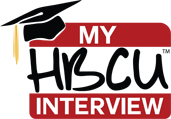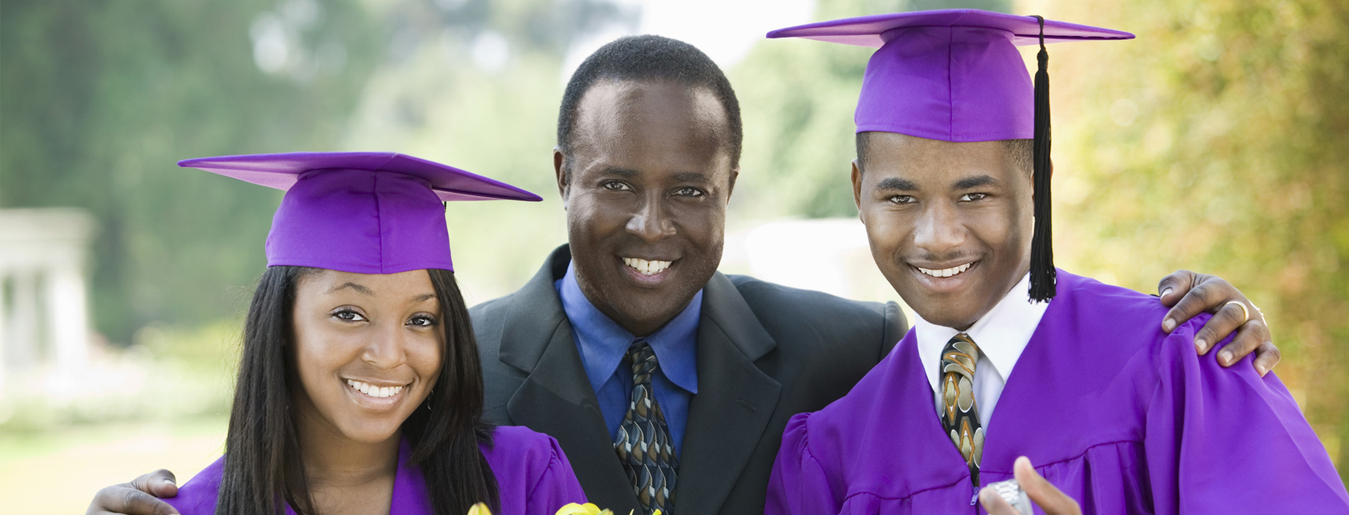
Shannon Whitaker, Lincoln University of Pennsylvania- c/o 2013, Religion
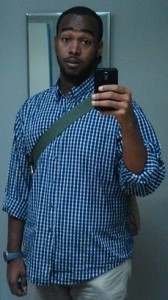
Where are you from? Who introduced you to HBCUs?*
I was born in Brooklyn NY. In my senior year of high school, I moved to Pennsylvania. I debated whether I wanted to go to college or not. When it came time for me to apply to colleges a few friends were telling me about Lincoln University and Cheyney University.
My aunt was the person that helped me search for schools. She went to Benedict College, so she lead me to looking up HBCUs. In my search I came across Lincoln University for a second time.
I remember growing up she would tell me about her college days. It all sounded like fun but I did not know if I wanted to go to college.
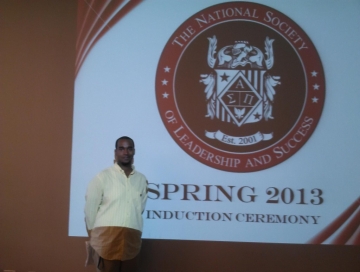
Shannon being inducted into the Sigma Alpha Pi: National Society of Leadership and Success | Image Credit: Shannon Whitaker
Why did you choose an HBCU over a pwi?*
All of the tours I took of HBCUs, I was amazed by the hospitality. I felt like I was family at the schools even before I applied. On the contrary, when I went to PWIs, it seemed like I was just another number. I am an advocate for community and I observed a sense of community touring HBCUs. Everyone on the HBCU campuses stopped to introduce themselves and share some insight with us. On the PWI campuses I didn’t get that same feeling.
[How did you decide to become a student at Lincoln University of Pennsylvania ?]
I started out attending University of Phoenix online. I did not like the experience at all. From there I decided I wanted a traditional college experience. I started looking at schools again.
It was two years after I had graduated from high school and I was starting college, again, as a freshmen. When I told people at work and church that I applied to colleges they were all excited.
However, when I told them one of my choices was Lincoln University, everyone urged me to go there. So when I received my acceptance letter it was a “no-brainer”, I was going to Lincoln University.
What is the story of your "experience" at Your HBCU given its heralded status as a stellar and prestigious institution?*
N/A
"First time" experiences at your HBCU?*
I received my first “F” in math at Lincoln. It blew my mind because in high school I was always in an advanced math class. On all of my standardize tests I took I placed in the high percentile or advance proficient scores.
My first professional performance singing was at Lincoln. As a music minor we were required to sing in a recital and perform in an Opera. I had my first real encounter with with my African roots and understanding of African Americans in the USA.
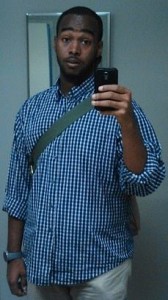
Shannon Whitaker, Proud HBCU Graduate of Lincoln University of Pennsylvania c/o ’13 | Image Credit: Shannon Whitaker
Who are the professors that have impacted your life in and out of the classroom? How did they do that?*
I would have to say all of my professors. Honestly, I can say all of my professors expected more of me than I was willing to give. They pushed me beyond expectations I had set for myself. They were really invested into me. They all gave me opportunities to experience something different.
I sang with the concert choir and we performed all over the east coast. I volunteered in Pine Ridge S.D. on a Native American reservation for a week. I went to Chicago to seminary preparation retreat. These experiences left an impression on me that I could never forget.
Professors like Prof. Edryn Coleman, Dr. Mel Leaman, and Rev. Frederick Faison forced me to live the experiences I was learning about. My experiences traveling and meeting people from all works of life is what help me in the classroom. That is what left an impression on me.
My professors at Lincoln were transparent with me. I could always walk into one of my professor’s offices talk whatever I was struggling with. Those talks helped me to build character and gain knowledge about myself and the world around me.
Ghost stories involving buildings or spots on campus?
I have seen ghost on campus. Nothing to be scared of. I used to walk past buildings in the older section of campus the window blinds would move.
Also a few times I waked the campus I felt like someone was following me but I felt like I was being protected. (Sorry I have a strong sense of spirituality).
What is your major? and Why did you choose it?
My major was Religion my minor was music. I choose religion as a major because I was interested in how there are so many different religions in the world and interested in how they all are prevalent in our world today.
I chose music as a minor because I stared singing in the concert choir. I spent so much time in the Ware Center practicing music I decided to learn more about what I was singing. I could not read music or play an instrument.
So I figured why not take the opportunity to improve my gift to sing.
What to date has been your proudest moment @ Your HBCU?
My proudest moment was graduating. After spending two semesters of struggling to pay a $4000 balance, maintaining a 3.0 gpa, and all the other academic obligations I had taking on, it was a relief. It was not easy but I did it.
What are the chants heard most often at the sporting events?
The cheerleaders chant was “Do it!!!”
Our school pride chant is “L.U. Lincoln Pride. L.U. Lincoln Pride. 1.8.5.4. The First HBCU for sure.” The Concert choir sings the alma mater The band had so many chants.
How are you positively active on campus? (e.g. clubs, SGA, etc.)
I think I went through most of them already. I participated in the campus’ first SYE Apprentice Program and my team won first place. I served as a member and the King of the NAACP. I was a band Manager for the Lincoln University Orange Crush Marching Band.
I sang all four years on the Lincoln University Concert Choir. I sang on the Men’s Glee Club. I also performed in three Operas (Treemonisha, Handsel and Gretel, and Kismet).
I served as a student minister for the Mary Dod Brown Memorial Chapel. I was a member of the Boys to Men mentoring organization. I was inducted into Sigma Alpha Pi: National Society of Leadership and Success. My friends and I also founded a music organization called Music In Us, aka the M.I.U. Project.
What and where are the historical places on campus?
Whole campus is historic, it’s the first HBCU. The chapel has the most history. Everyone from Cornell West to Mary McCloud Bethune and Malcolm X to Einstein visited the Chapel. There is a hidden room underneath the chapel that local Quakers used to hide slaves as they escaped from the south on the Underground Railroad.
What to date has been your saddest moment at your HBCU?
During 2010-2011, Lincoln lost about five students. It was a difficult time for us students getting that news within months apart of a fellow Lion’s death.
The most troubling moment was the car accident the happened right outside the campus gates with three students in the car. We lost on brother, one was critically injured and the other by the God’s grace walked out with a leg injury. That day will never be forgotten on Lincoln Campus.
Even to this day it’s a sensitive topic to talk about.
When and how did you discover your passion in life?
Going into undergrad I knew I wanted to do something with children as far as mentoring or guidance. Going back to visit youths from my past neighborhood and seeing how they looked at me as role model.
That made me feel like I had done something to show little kings and queens that it’s possible.
After I graduated, one of my Lincoln Bros asked me to come speak to some of his students at Discovery Charter School in Philadelphia.
I saw how well prepared the students were. In middle school I had no idea about college, but going to that school and seeing those student passionate about their education impressed me.
Being there was not about me though, I was there to share with them things nobody had ever told me. It was a great chance to impact some children that want better form themselves.
What's your take on life (in the philosophical sense)?
Life is a journey leading us to live in the world collectively. We are not here to kill each other but to learn to live with each other. We are all created unique and are different from one another. Embrace your brothers and sisters for the good they do.
Point out their flaws but don’t hold them in judgment because you’ll never see their progress. Everyone has a story to share; if we take the time to stop and listen we would understand a lot more then we do.
Adding experience to what you know helps to retain knowledge and makes it more effective in practice.
If you could speak to those family members that have risen but that live forever through you, what words would you speak?
I embrace my heritage because of the legacy you left behind. It took me while to realize the sacrifices made for me but, I understand it now.
What and when was your first encounter with racism?
I deal with racism everyday. Everyday my cultural, ethnicity, genetic make-up, geographical make-up, my history, the way I speak, my religious beliefs, and who I affiliate myself with socially gets profiled.
Growing up I was quiet and shy, I didn’t fight so I ignored the ignorant people. In high school, I grew into a person that took pride in who I was.
I started finding out things about myself and felt like I needed to defend who I was and what I did. I was always ready to argue my stance in life. One of my teachers told me “You don’t have to explain your life to anyone that has not impacted it!”
I never knew what he meant until a few years ago. I know who I am and I live in who I am; everyone will find something to oppress you.
The saying says “Actions speak louder than words,” so I just like to keep moving. Through my actions and work I show all my oppressors I can do more than they have stereotyped me as.
If it someone at work I try to explain my views not to make them change but to give them a new perspective. If its someone I don’t know I just pray that the next person they come in contact with doesn’t hurt them and that they grow in their racial mindset.
How did your HBCU prepare you for a diverse workplace?
Lincoln University helped me to become more diverse in my thought because it opened me open to think in a perspective other than mine. There were always events to make us think outside of our own thoughts. As students we’d get together and talk through our thoughts about different topics that were affecting us. Sometimes they ended in debates but we all understood that it was our opinion. We left understanding another perspective.
If you could only speak two sentences to the youth coming after you what would you say?
This country was built on the shoulders of strong black men and woman and so is your history. Do not be ignorant enough to believe the basics as the whole truth; do our own research to figure out what the whole story is.
Category : Alumni
Tags : Lincoln University of Pennsylvania, 2013, Music, Religion
Comments
Lincoln University of Pennsylvania
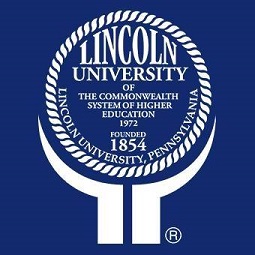
-
Students: 1,902
- Athletics: Lincoln University of Pennsylvania participates in the NCAA as a Division II institution. Lincoln has won 17 NCAA Division III Track & Field championships since 1985. Lincoln competes as a Division II member of the Central Intercollegiate Athletic Association and, the Eastern College Athletic Conference. Lincoln Lions compete in intercollegiate athletics in the following sports: Baseball, Soccer (Women), Basketball (Men & Women), Volleyball (Women), Indoor Track (Men & Women), Outdoor Track (Men & Women), Cross-Country (Men & Women), Softball, and Football.
- Notable Alumni: Ebenezer Ako-Adjei Ghanaian politician, member of the United Gold Coast Convention and The Big Six** Nnamdi Azikiwe 1930 first President of Nigeria** Cab Calloway 1930 entertainer, bandleader** Archibald H. Grimke 1870 lawyer, journalist, public speaker, member of the Niagara Movement** Langston Hughes 1929 poet** Larry Neal 1961 Black Arts Movement leader in the 1960s** Kwame Nkrumah 1939 first President of the modern Ghana** Dr. Joseph C. Price 1879 founder of Livingstone College** William Drew Robeson I 1876 minister, father of Paul Robeson** James H. Robinson 1935 founder of Operation Crossroads Africa (a model for the Peace Corps); Chapters 8, 9 and 10 of Robinson's 1950 autobiography, Road Without Turning, describe life at Lincoln in the early 1930s** Gil Scott-Heron attended, early 1970s, activist, singer-songwriter** Clive Terrelonge 1994 Olympic track and field athlete from Jamaica** Mose Penaani Tjitendero 1968 Namibian politician; former Speaker of the National Assembly of Namibia ;Chairman, SWAPO Central Committee** Tjama Tjivikua 1983 Rector of the Polytechnic of Namibia** Albert H. Wheeler 1936 first African American Mayor of Ann Arbor, Michigan**
-
Website: http://www.lincoln.edu/
- Click here to view on Wikipedia
